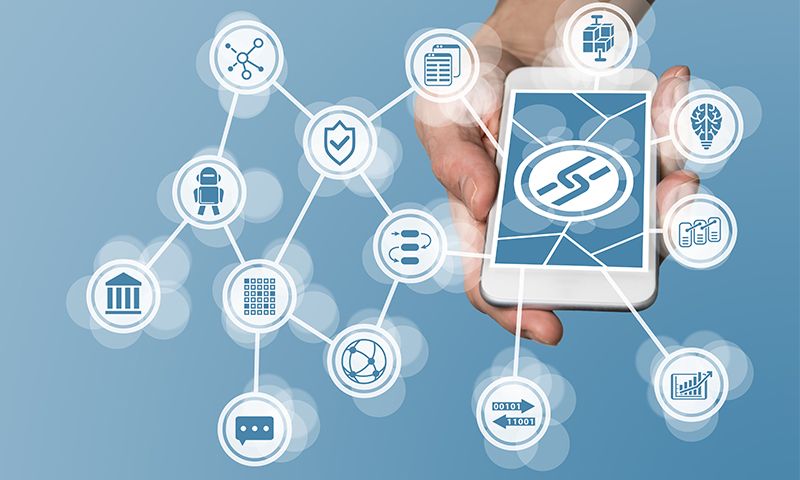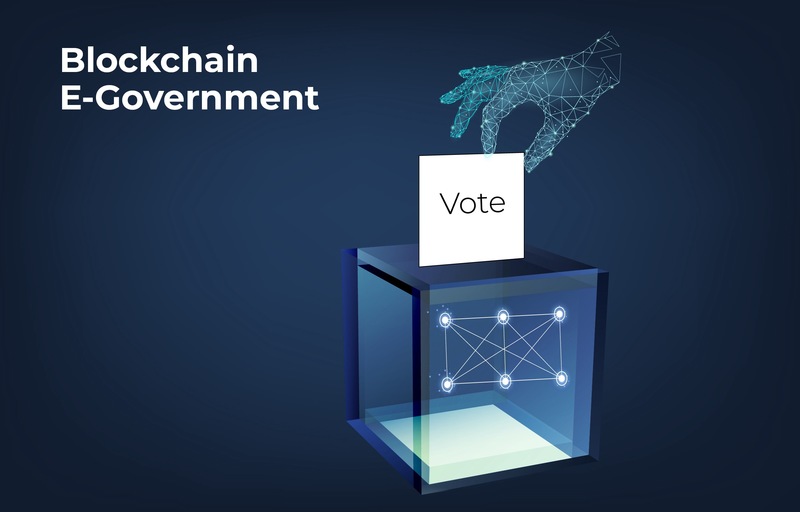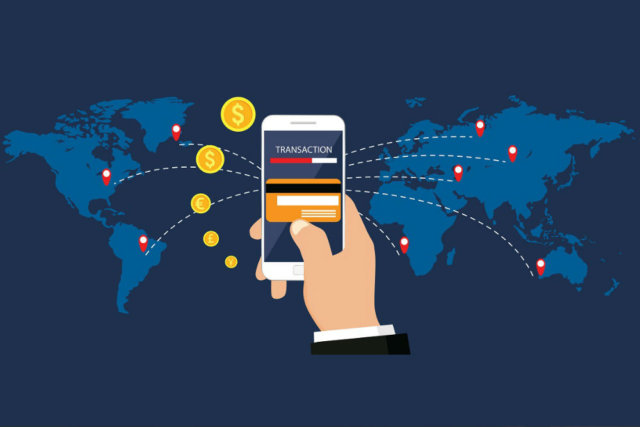Blockchain Technology: How Industries, Sectors Can Implement It


- Using blockchain outside cryptos
- General purpose of blockchain
- How government agencies can benefit from blockchain
- Blockchain and financial institutions
- Effect on communications and deals
Blockchain technology created a revolution in recording transactions, with bitcoin being the first to take advantage of its many benefits. Today, establishments and individuals alike are starting to realize the implications of this development.
Thanks to blockchain’s efficient and secure nature, ideas are forming left and right on how to implement it in any industry related to data-recording. Although this technology is relatively new and still under development, companies and firms are already adopting it for developing applications.
In other words, blockchain can reform the many foundations of different sectors. It is not only restricted to cryptocurrencies. In this guide, I will do a walkthrough of how users and organizations can benefit from this technology.
Blockchain Outside Of Cryptocurrency
Blockchain is best known for being the underlying technology for bitcoin. But many now see what it can do to transform other industries. Here are the various non-cryptocurrency uses for blockchain:
General Purpose


We already know that blockchain and cryptocurrency go together like a horse and carriage. But other sectors can use the technology for practical usage, not just storing monetary transactions.
Digital Identity
With the use of cryptographic keys, people can have ownership rights with the backing of a strong digital network. Blockchain can provide a secure system for storing information regarding online identity.
How exactly is this secure? Well, users no longer need to give away sensitive information. The process is simply a push transaction, which means owning a private key equates to having a digital asset.
Microsoft and Accenture adopted this form of record-keeping two years ago. They created a joint project to build an ID network through blockchain technology. This digital grid provides legal identification to a large number of people all over the world (estimated at 1.1 billion) without using any official documents.
Improved Cybersecurity
Blockchain communications use complex cryptographic procedures to verify the source of the data it receives. Therefore, it leaves little to no room for hackers who try to intercept such sensitive or personal information.
Furthermore, this technology features a self-enacting code that denies or grants access to different networks depending on the type of command. Companies such as Verizon already implement it because it enhances cybersecurity and the authentication of digital identities.
Blockchain can revolutionize Internet security by providing key cryptography authentication. The process verifies the validity of a transaction by checking if the right private key was in use. Now, that’s a massive improvement from traditional passwords, which are often kept inside unsafe servers.
So as you can see, blockchain can drastically shift the volatile nature of digital identities as we know it.
Tokenization
Tokenization allows you to fractionalize the ownership of a digital asset using “tokens.” And with blockchain, the proof of purchase and chain of custody are practically immutable and tamper-proof.
Hypothetically speaking, you can tokenize using both physical and digital assets. However, with no regulations or laws in place, claiming the title of tangible property with no government records to back you up might yield unfortunate results.
With that in mind, there are already many projects under development that seek to tokenize physical assets. That includes paintings, precious gemstones, and properties.
Inter-organizational Management Of Data
With the rise of blockchain, a breakthrough in computing power, and cryptography, a new form of distributed ledgers is now in the making. In their simplest form, these registers are databases that each user (or node) updates inside a larger network.
But the unique thing about them is that there is no central administrator for data storage. Instead, they spread across several nodes on a peer-to-peer network, where each one duplicates and saves an identical copy of the ledger. They also update independently.
Whenever there’s a transaction, each node processes it then vote by consensus algorithm which copy is correct. After that, all the other nodes update themselves to the new, accurate version. This complex architecture enables a more flexible recording system that is better than conventional databases.
And it also allows us to secure and formalize different transactions inside the digital world. Hundreds of establishments are seeing the potential of this technology. The International Data Corporation (IDC) reported that the services and distribution sector invested around $379 million last year for the implementation of blockchain technology.
“Enthusiasm for blockchain continues to be universally shared across regions as businesses and organizations alike continue to explore the technology’s potential business application.”
Stacey Soohoo, research manager with IDC’s Customer Insights & Analysis team
Securing Business Transactions
As I already mentioned, the blockchain is a permanent and immutable ledger. Therefore, it’s easy to trace and identify an asset’s chain of ownership. By storing the serial numbers and other information relating to product identity inside the blockchain, every party (consumers, retailers, distributors, and manufacturers) can verify the authenticity of a particular item.
Blockverify implements blockchain technology to boost the safety measures that combat counterfeiting. They do so by identifying the product’s legitimacy and help companies monitor their chains of supply and product authenticity.
The world’s leading diamond company, De Beers, uses a digital recording for each of its diamonds through blockchain technology. That reduces the risk of theft or conflict diamonds.
Digital Twins
A digital twin is a digital replica of any physical asset. By using a combination of artificial intelligence, human input, and sensor data, these duplicates can exist simultaneously with their physical counterparts. That creates additional value by giving another medium for simulation, troubleshooting, maintenance, training, and many more.
Deloitte, for example, uses digital twins to quickly find any physical defects, and create higher-quality products. The professional services company also implements this technology to increase the accuracy of their predicted outcomes.
GE, on the other hand, uses it to optimize the wind farms that they control. As a result, it led to a 20% increase in their yearly energy production.
Supply Chain Enhancement
Using blockchain technology, you can optimize and monitor the chain of supply: From the raw materials right up to the finished product.
Walmart, one of America’s biggest supply chains, uses blockchain to scan goods via its app. It also allows employees to track every product’s development process.
Maersk, the biggest shipping company in the world, traces its cargo ships through blockchain technology as well. Meanwhile, British Airways apply it to verify information accuracy across its apps, websites, and airport.
Thousands of businesses are starting to implement blockchain. The International Data Corporation reported that the resources and manufacturing sector spent $334 million on this technology.
Government Use


Governments have held a keen interest in these specific blockchain components:
- The ownership rights of cryptographic keys, as well as their generation, revocation, loss, and replacement.
- The users of the blockchain themselves.
- The protocols of blockchain.
According to IBM, 90% of all government organizations are already planning to implement blockchain technology. And hopefully, these plans will take shape soon.
Border Patrol and Customs
In 2017, the US border Patrol seized over $5.8 million in goods. And Judging by the high traffic of merchandise coming into the country, this significant amount is just the beginning.
Blockchain technology can help determine the origin and legitimacy of any shipment going inside the US. At the same time, it provides records that update real-time so that customs agents will have better data for planning and operations.
Interagency Data Management
Structural improvements can save millions of tax dollars. Implementing standardized systems for government agencies can help them achieve better efficiency.
The uniformity of isolated and centralized departments, along with the numerous bureaucratic practices and standards, can make payment processing and data sharing almost impossible and costly to boot.
Blockchain can establish a mode of communication to protect government databases from any data loss or breach. It also creates one standard that all state agencies can follow, reduces training time and costs, and brings down administrative fees.
By improving the management of data, different sectors can offer their services much faster while reducing the tax dollar budget.
Automated Governance
If you want an example of automated governance, take a look at bitcoin. Blockchain protocols allowed the cryptocurrency to digitize its models. However, the rise of BTC mining created another form of governance model, which resulted in a difference of opinion concerning this feature.
These disagreements are about blockchain’s ability to create “forks,” which are collectively-agreed-upon software updates.
Voter Verification
It’s been three years since the 2016 US presidential elections, where numerous allegations of voter fraud arose. And the talk of illegal votes is still going strong. Electoral fraud remains a threat to our democratic way of life.
Fortunately, blockchain technology can help government agencies implement a permanent and tamper-proof vote-counting process.
However, several obstacles must be cleared away before blockchain can become a voting medium. For one, public officials need to study the technological nuances and evaluate the feedback from both the administrators and voters.
In May 2019, The US National Conference of State Legislatures released a report that featured the use of electronic transmissions for ballots. It stated that only uniformed and overseas citizens, like military voters, were allowed to submit their votes electronically.
The report added that “conducting elections entirely via the internet is not something states are considering now or in the near future.”
Blockchain needs more testing, and it has to be available for a fair price so that the majority of people can use it. So far, the only state that is actively trying to implement blockchain is West Virginia. They offer a mobile app that enables voters under the Uniformed and Overseas Citizens Absentee Voting Act (UOCAVA) to vote electronically.
Financial Institutions


There have been fewer technological advancements that have disrupted the financial sector than blockchain technology. Despite being a platform for crypto transactions, this technology has now matured and is starting to turn into a potential replacement for traditional operations.
Banks and other financial institutions are starting to realize that they need to implement this tech in their sector. Otherwise, they risk the chance of becoming obsolete. According to the International Data Corporation, the financial sector invested $552 million on blockchain technology last year.
And according to Law Technology Today, 90% of all North American and European banks were exploring the uses of blockchain.
Accounting and Auditing
While a majority of the world’s databases are mere “snapshots” of moments in time, a blockchain database has a transaction history that’s automatically updated for all its users. The implications of this technology for accounting and auditing are profound.
By using a client-server model, large institutions like banks that help people create digital relationships are forced to secure their users’ account information. While banks need to spend an excessive amount of money on security (we’re talking billions), the current system is also forcing other firms to do so as well.
After all, we often share the same private information to access the services of these businesses.
Despite their safety measures, many companies suffer network breaches, exposing the financial details of thousands of customers. But with blockchain technology, each user gets its own automatic record, with control to allow or deny access to their information.
Aside from financial details, blockchain can also protect medical records.
Cross-border Transactions
With blockchain, financial institutions can create fast and efficient links to avoid correspondent banking. Competitive businesses in the sector can use blockchain’s common database to execute transactions without relying on a central management system.
To put it simply, banks can now secure and formalize their digital relationships with each other in more ways than before.
Clearing and Settlement
In the world of paper trading, the general time frame for a transaction’s clearing and settlement is called “T+3.” And this refers to the three days it takes to complete the trade (T).
But with blockchain technology, the whole trading process, from execution to clearing and settlement, happens in a matter of minutes. And digital ownership, along with the crypto keys, will lower the chances of counterparty risk and post-trade latency.
Regulatory Compliance Automation
Blockchain has the potential to give regulators an accessible and transparent system. This technology can be coded to reject and authorize transactions to comply with a standard.
Now, blockchain can go beyond being a secure database. It can now automatically enact regulatory compliance when its code is manipulated. With banks, for instance, they can improve their efficiency when it comes to AML (anti-money laundering) compliance.
That showcases the flexibility of the technology, as you can use it to report or permit transactions depending on the rules implemented into the system. Through this tech, banks can automate deal authorization or regulatory reporting.
As a result, blockchain will save millions for financial institutions. According to Sipotra’s 2018 report, financial companies could reduce costs by $12 billion per year by using blockchain.
Platform Potential


Plenty of businesses can enhance their systems using blockchain. This technology can now act as a platform for communications more. The Grand View Research’s 2019 Market Report expects that the global market for blockchain technology will generate $7.59 billion by 2024.
Smart Contracts
Smart contracts give businesses and individuals access to a digital document that implements blockchain technology. They implement a specific set of programmed rules, which the parties involved have to respect (much like a traditional agreement).
Once all parties agree to the terms, the funds are released automatically. Smart contracts eliminate the need for third parties or intermediaries, which saves money, time, and conflict.
Blockchain technology was a major contributor to the rising popularity of smart contracts. Today, 71% of the world’s business leaders using blockchain believe that it plays a major role in technological advancement.
Marketing and Advertisement
Advertising in the online world is a very challenging practice because the measurement of any related statistics is hard to verify. Even large and established sites such as Facebook have apologized for errors in their reports.
Advertisers measure the number of clicks on their websites, as well as their followers on different social media accounts. However, the resulting amount can be inaccurate because it’s hard to differentiate between users and bots.
This year, the Association of National Advertisers, along with WhiteOps, a digital security company, conducted a study on the current state of advertising fraud. They found that bot fraud causes a total of $5.8 billion in losses.
Fortunately, blockchain can put an end to this by granting marketers access to a transparent and encrypted chain. The procedure allows companies to determine their “real” audience. Businesses such as AdChain are putting this technology into actual practice.
Moreover, Influencer marketing is becoming a more relevant form of advertising with each passing year. But it faces similar issues that ads companies are experiencing. Luckily, blockchain can solve these problems by allowing brands to identify the actual followers of the influencer.
Encrypted Messaging
This form of digital messaging can now act as table stakes when it comes to business-related communication. Although there are plenty of other solutions to solve end-to-end encryption, blockchain inspires a different approach that can leverage decentralization.
This technology allows you to send messages anonymously and conceal your IP address. Also, there are encrypted messaging services that are blockchain-based. Therefore, you can send private messages while transacting with cryptos anonymously.
Numerous platforms such as Matrix, ADAMANT, and Crypviser use encrypted messaging powered by blockchain technology.
Blockchain Outside Cryptocurrency – Final Words
The world of cryptocurrency is no longer the only sector that can benefit from the blockchain. The full potential of this technology has yet to unfold. And we can only hope the following years will bring widespread experimentation and implementation of blockchain in various industries.
Whether you’re a business owner or part of the general public, you will generally see more efficiency and safety when it comes to blockchain services.
Do you think businesses and government agencies should implement blockchain technology? Tell us what you think below.



